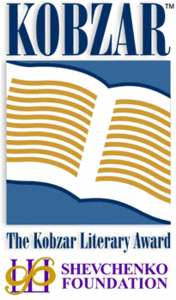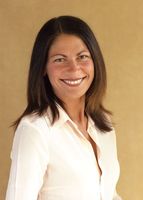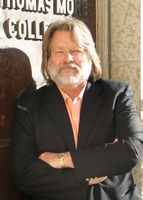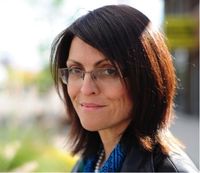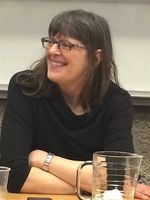"This Story Has Lessons for all Canadians" The 2018 Kobzar Literary Award Finalists on Ukrainian Canadian Writing & Culture
A unique award in the Canadian literary landscape, The Kobzar Literary Award recognizes outstanding writing by authors who develop a Ukrainian Canadian theme in their work. Ukrainian Canadians are estimated to be the ninth largest ethnic group in the country, with a population over 1 million, and the Shevchenko Foundation celebrates the community's contributions to the artistic landscape through the Kobzar Award, which is presented every other year.
Today we welcome the five finalists to Open Book to tell us about their nominated titles, their connection to Ukrainian culture, and the experience of being nominated for the $25,000 prize.
It's a varied shortlist each year due to that fact that the award is open to a wide breadth of genres (literary non-fiction, fiction, poetry, young readers' literature, plays, screenplays, and musicals). This year, four non-fiction books and one poetry collection are nominated: Lisa Grekul and Lindy Ledohowski, ed. for Unbound: Ukrainian Canadians Writing Home (University of Toronto Press); Bohdan S. Kordan for No Free Man: Canada, the Great War and the Enemy Alien Experience (McGill-Queen's University Press); Natalia Khanenko-Friesen for Ukrainian Otherlands: Diaspora, Homeland, and Folk Imagination in the Twentieth Century (University of Wisconsin Press); Erin Mouré for Kapusta (House of Anansi Press); and Alexandra Risen for Unearthed: Love, Acceptance, and Other Lessons from an Abandoned Garden (a memoir) (Viking, a division of Penguin Random House Canada Ltd). In a unique twist, Mouré is in the unusual position of being nominated for her collection of poetry while having also contributed an essay to Grekul and Ledohowski's Unbound.
The 2018 jury is composed of writer, critic and scholar Randy Boyagoda; literary non-fiction writer and political and cultural commentator Charlotte Gray, CM; and poet and nonfiction writer Maurice Mierau, winner of the 2016 Kobzar Literary Award.
The winner will be announced on March 1, 2018 at a gala presentation in Toronto.
Today the nominees tell us about why this particular award has such personal value for them, the untold Ukrainian Canadian stories they are sharing now, and a celebratory potluck you'll want to be invited to.
Open Book:
What does it mean to you to be nominated for a prize focused on Ukrainian Canadian themes? Do you feel the Ukrainian experience is central to your writing life?
Natalia Khanenko-Friesen:
I was born and raised in Ukraine and many might see me as a representative of a fourth or fifth immigration wave, depending on the count. As is commonly the case with many folks from Central Ukraine, I have never had any personal connection to Ukrainian Canadians prior to my coming to Canada. Once I arrived to Alberta, the prairies stole my heart and have never let it go. Ukrainian Canadian culture, with its beginnings on the prairies, became my lifelong passion and lifelong journey. Being nominated for the Kobzar Literary Award means, at least to me, that I perhaps have become a more rooted Ukrainian Canadian. It also means that what I do as a scholar, how I see and understand the Ukrainian Canadian experience, has value beyond the academic universe and this is immensely satisfactory to me as well.
Bohdan S. Kordan:
I consider myself a writer with a particular tale to tell. It is the story of a community – my community – that faced exceptional hardship and trial at a moment in time. It is the story of struggle and resilience. Sadly, it is not well known. But in as much as this story has lessons for all Canadians, it needs to be told, heard, and recognized. In no small way, being nominated for the national Kobzar Award does this. I consider myself fortunate to be part of a community that cherishes and honours its storytellers, giving affirmation to the belief that the stories of each and every community, which make up the grand narrative that is Canada, must be told and are worth telling.
Lisa Grekul:
Being on the shortlist for this prize is an honour for all of us who collaborated on Unbound: Ukrainian Canadians Writing Home. I see the nomination as recognition for the kinds of risks that we’ve taken, and continue to take, in our writing, which often falls through the cracks of mainstream Canadian literature.
For me, there’s no separation between my identity as Ukrainian Canadian and the work that I do: they go hand-in-hand. As a scholar and creative writer, and also a professor of “CanLit,” I keep circling back to questions about what it means to be Ukrainian and Canadian, insisting that the answers are necessarily varied, sometimes fraught, and never “fixed” or unchangeable.
Your CanLit News
Subscribe to Open Book’s newsletter to get local book events, literary content, writing tips, and more in your inbox
Lindy Lehohowski:
Ever since the launch of the Kobzar Literary Awards I have been a fan and supporter of them. For the past 15 years, my academic and scholarly research has focused on Ukrainian Canadian literature in English, and so I have long been familiar with so much of the amazing literature written by and about Ukrainian Canadian-ness over the last 70 years. However, I never expected to find myself among the finalists. It is an honour and pleasure.
Erin Mouré:
There is no “the” Ukrainian experience. There were waves of immigration—5 at least—early 20th century to the prairies following the land grabs of the first treaties, second wave in the late 1920s when abandoned homesteads in northwest AB were taken up again and the last blocks of the North Peace in BC were opened (the latter after the last adherents to Treaty 8), postwar immigration to cities like Toronto, the post-Soviet wave of immigration of younger people, again to cities, and the “new Silicon Valley” immigrations of young men (mostly) working in tech fields, ongoing today. There is also the great silence of the Dead whose emigration is inside us as memories: those of the Holodomor in the East in what was the Russian Empire, and those of the Holocaust that took the lives of Ukrainian Jews in the west that was part of the Austro-Hungarian Empire, and in the east too, wherever Nazis occupied.
All of the experience of migration and sorrow and, particularly, mixity is central to my writing life and who I am. It is a great honour for Kapusta to be nominated for the Kobzar prize for it shows an openness to all the stories.
Alexandra Risen:
The nomination is an unexpected honour, for which I am grateful, thank you. I only wish my parents were here to see it. My sister Sonia tells me they are thrilled from where they watch.
For me, this nomination represents a full circle completion of my recognition of my mother and father and their friends from the Ukrainian diaspora who lived only for the benefit of the future generations, the best they could, under often dire circumstances. I am humbled that Unearthed will be shared with more people—I’ve learned I’m not alone through the many readers I’ve connected with over the past year. I am soon to turn fifty-six and the Ukrainian experience has formed who I am, being the “transition” generation. Witnessing and, with the benefit of wisdom, better understanding my parents’ sacrifices and achievements in Canada has shaped me immeasurably. I see it in my daily interactions with my son, in the way I identify myself as a Canadian and in the way I embrace new cultures. My parent’s experiences have opened my eyes to the Ukrainian experience more broadly, their birthplace and its history, its tradition, its challenges, the general immigration/refugee questions that continue to plague the world today, and to the profound force, which inevitably bound us back together, our love for the soil.
OB:
Tell us a little about your nominated book and when you began working on it.
NKF:
The book is the result of some twenty years of my explorations into the Ukrainian Canadian culture. It discusses how the Ukrainian Canadians and Ukrainians in Ukraine are tied together in a powerful symbolic relationship because of who they are. The stories I cite in the book are drawn from the two worlds, the one I called ‘diaspora’ and the other ‘homeland’. Given the global politics of the 20th century, the geography and the distances between Ukraine and Canada, these two worlds have been quite disconnected for a long time. And in both worlds, those who once were a family and then their descendants continued to build their lives on their respective ends of this diaspora-homeland divide, while never fully forgetting the ‘other’ Ukrainians. Nostalgia first and then imagination were called in to help the divided kinfolk to process the distance that just kept growing between the two branches of what once was the same kin. Thus, the two worlds became the two otherlands, tied to each other by memory, nostalgia and imagination. I don’t discuss politics or organizational life in the book. Rather, I look at how folk songs, folk poetry, personal letters, understandings of family and kinship all explain the different ways in which Ukrainian Canadians perceive their ethnic homeland and its people and the Ukrainians in Ukraine perceive diaspora Ukrainians.
BSK:
This book is about human rights. But it is also about the relationship of a government and its people. It is an account of how and why government failed in its promise to be mindful of the rights of a people made vulnerable by the vagaries of war. As a child of immigrant parents – those who would come to this country with the hope and expectation that they would be extended fair and just treatment – this has been something of a preoccupation of mine. This book is an extension of that concern and therefore a constant, written as it were from a deep yearning there be justice and respect for everyman.
LG:
The book was years in the making! In 2009 or 2010, Lindy Ledohowski and I started envisioning a co-edited collection of work by Ukrainian Canadian writers, established and new, focused on the relation between their ethnic and writerly identities. We weren’t much more specific than that when we approached Janice Kulyk Keefer, Elizabeth Bachinsky, Marsha Forchuk Skrypuch, Marusya Bociurkiw, Erín Moure, Daria Salamon, and Myrna Kostash. In fact, even more broadly, we were after their perspectives on Ukrainian Canadian-ness today, and we didn’t want them to feel “bound” by genre, so we encouraged hybrid pieces—poetry/prose, essay/story, autobiography/history, you name it. We welcomed rule-breaking, and the contributors came through. They exceeded our expectations.
A lot happened from the beginning of the project, when it was nothing more than an idea, to its release as a book. We witnessed horrors on the world-stage—in Ukraine, specifically—and faced changes and challenges in our personal lives. I credit Lindy, an unstoppable force, for keeping the project going: among (many) other things, she found us a publisher and the funding that we needed to proceed. I credit our contributors, too (including Weronika Suchaka, who wrote the preface to Unbound) and our editor at the University of Toronto Press, Siobhan McMenemy, for their patience and professionalism as we went through a stringent peer-review process and several rounds of revisions. We’re grateful to Natalka Husar for the use of her art on our front cover.
LL:
I am one of the co-editors of Unbound: Ukrainian Canadians Writing Home. This is a collection of prose/poetry/essays written by and about Ukrainian Canadians. It offers multiple view points and multiple ways in to the question around what being Ukrainian Canadian means to the authors found within the pages of our book. We began working on this book in 2010! Actually, it began with a planned symposium to bring together voices from the world of Ukrainian Canadiana. From there, our symposium participants provided such interesting, diverse, insightful, and honest approaches to the general question “what does it mean to be Ukrainian in today’s Canada?” that we realized we just had to collect their voices together in a book. From there, we added a few additional authors who weren’t part of the original symposium and asked all our contributors to revise, extend, and/or edit their submissions for inclusion in book form. We were also lucky enough that Natalka Husar allowed us to use one of her paintings as the cover art – adding a kind of visual essay as a complement to the written submissions. As a scholar focusing on identity politics and ethnicity, I am of the firm belief that there are multiple identities and multiple ways of belonging to various group identities simultaneously, and I couldn’t think of a better way of capturing that multiplicity than to bring together multiple voices. As well, it gave me the opportunity to collaborate with Lisa Grekul as my co-editor. I first met Lisa at a conference early in my PhD, and at that point she was the only person who had completed doctoral work on the literature that was the focus of my own research. She was an is an inspiration and became a friend through this collaboration.
EM:
Kapusta is a book of poems in the form of a play, a documentary theatre, written in what might be best called a distributed monologue. With elements of musical theatre, as my mother loved musicals. It sloughs off leaves and leaves and leaves wound tightly around a core, like a cabbage, a kapusta. It is about a mother and daughter and a heritage, and the complexity of the histories of “the Old Country” and their sorrows, and about the responsibility we each have, each and all, to act to prevent genocides (which we are still no good at, we turn away). I started working on it after writing The Unmemntioable. There I had dealt with the complexity of my mother’s history and of going to Ukraine to the village where she was born with her ashes as she had wished, and finding out the complexities of structures, histories, tellings. But I had not addressed fully the source of my grandparents’ sadness, of which my mother spoke, which stemmed from them learning in Alberta of events in their natal village during the Nazi occupation, specifically, events of Operation Reinhardt, or Einsatz Reinhardt. Events of death and inhumanity of which no one spoke, except at night, and that silence or “unmentionable” haunts all of us even today.
All the stories are in that cabbage, held there.
AR:
Unearthed is a memoir, so I suppose I began working on it when I was born! Actually, it was written over the course of five years. Unearthed is primarily focused on love, family, the importance of a cultural legacy, and our interconnectedness with nature, an elemental grounding force for many Ukrainians. Several people have described Unearthed as a love letter to my parents and my garden and about how the restorative healing power of nature helps us reconcile with those we love. In the memoir, I restore a historic abandoned garden over a ten year period while I examine my parents’ history through the war years, and their rebuilding of a new future for themselves as part of the Ukrainian diaspora, tackling the sometimes difficult subject of growing up first generation Canadian, and exploring the challenges faced by Ukrainian immigrants as they assimilated into the New World.
OB:
If you are awarded the 2018 Kobzar Award, how might you celebrate?
NKF:
Good question! As my family supported me all the way through with this project, I would first celebrate the amazing news with them. Apart from offering a chance for a good party, winning the award would provide an opportunity to celebrate all those people whose stories made the book in the first place. I would like to host an event to do just that!. And then it would be time to turn to the next project.
BSK:
As an expression of community support and engagement with the literary arts scene in Canada, the Kobzar Award recognizes Canadian writers who through their work contribute to its development. I can think of nothing better than celebrating the Kobzar Award with my fellow nominees in the warm embrace of a community that by way of this gala shows its commitment to this endeavour.
LG:
Honestly, I’m too superstitious to think about celebrating. And as thrilled as I am with the nomination, it doesn’t come close to the feeling of holding the first copy of our book in my hands and knowing that it was, finally, finding its way out into the world. To have had a chance to collaborate with a group of writers who have been inspirations to me and powerful role models? I’m already a winner. Maybe one day all of us who worked on the book will meet in one place; given the fact that we’re scattered around the country, and indeed the world, it hasn’t happened yet. If or when it does happen, I say we make it a potluck: I’ll bring wine from the Okanagan. Anyone stuck for recipes could look to my dear friend Marusya Bociurkiw’s Comfort Food for Breakups: The Memoir of a Hungry Girl. I suspect that, in short order, we’d start planning a second volume of Unbound.
LL:
Well, there will, of course be champagne! In reality, I would likely use this award as an excuse to head to UBC Okanagan where my co-editor is a professor so that she and I could celebrate together. Throughout the entirety of this collaboration together, we have not seen each other. In fact, we last saw each other face-to-face back at a conference in 2008! It is one of the wonders of this era that co-editors can work on a book from opposite ends of the country, but it’s a bit sad too.
EM:
There are excellent and exciting books in nomination (including Unbound: Ukrainian Canadians Writing Home, in which I am proud to have a small essay). Kapusta deals with questions that radically discomfit “the” story of “the” Ukrainian experience, and it is an arduous book—fortunately, if you wear a cabbage leaf on your head under your hat, it will cure the headache.
I am very honoured that the judges chose to select Kapusta as a finalist, and I look forward to celebrating whoever wins and sharing their joy. Hurrah for Ukrainian difference, I say.
AR:
What a wonderful outcome that would be. I would finally crack open that bottle of sour cherry liqueur that my sister made (with cherries from her garden) in memory of my mother (see Chapter One of Unearthed). I would raise a toast to my parents with Sonia, long-distance, since she lives in Edmonton and I live in Toronto. We would toast all the things said, and unsaid, by our parents.
In addition, a parent’s legacy is nothing if not put to productive use. Should I be the recipient of this honour, I would want to dedicate it to the furthering the awareness of the Ukrainian experience to the next generation through the endowment of a scholarship in the name of my mother and father, Stefania and Ivan Risen, for Ukrainian studies at the University of Toronto. I studied creative writing there for five years, and the professors and students in various Ukrainian courses are doing important work that I witnessed firsthand when researching Unearthed. Knowing how much my parents supported education, I know they would approve.
_______________________________
Learn more about the Kobzar Literary Award on their website, and stay tuned for news of the winner on March 1!
